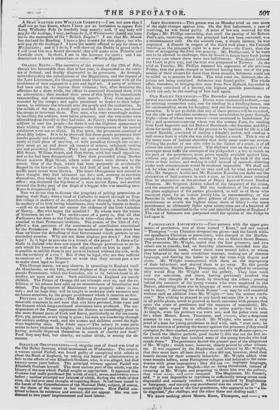IEEE SoLoncees.—This person was on Monday tried on two more
of the eight charges against him. On the first indictment, a case of receiving, he was found guilty. A point of law was reserved for the Judges;; Mr. Phillips contending, that until the passing of Sir Robert Peel's acts, receiving, where the principal had not been convicted, was a misdemeanour only. On the seventh case, a simple larceny, he was acquitted. A dispute in respect of the third took place ;. the Counsel insisting 'on the prisoner's right to a new Jury—the Court, that the time of arraigning the Jury was gone by. Mr. Phillips said, if he were not to be allowed to challenge, then he would in future have fresh juries on every case where there were two indictments. This threat induced the Court to give way, and the trial was postponed to Tuesday. At the trial on Tuesday, Mr. Phillips repeated his argument of the previous Friday, that the goods charged as received having been out of the pos• session of their owners for more than three months, Solomons could not be called on to account for them. The trial went on, however, the ob. jection not being sustained. Solomons was found guilty. The whole affair, therefore, of bringing this man from New Holland, has ended in his being convicted of a larceny, the highest possible punishment of which can only be the sending of him back again.
OLD BAILEY SENTENCES.—The Recorder passed :sentence on the several convicts on Wednesday. Eleven were condemned to death,—one for uttering counterfeit coin, one for stealing in a dwelling-house, one for cattle-stealing, seven for burglary, and one for returning from trans. portation. It is not probable that any of these persons will be executed, but the idle and ridiculous ceremony must nevertheless be gone through. Eight—three of whom were women—were sentenced to banishment for life ; and seventeen—among whom was the woman Fenn, for stealing from Lord Ingestrie and the Duke of Buccleuch—for fourteen, and fifty- three for seven years. One of the persons to be banished for life is a lad named Kemble, convicted of cutting a female's pocket, and stealing a half-crown from it while she was riding behind a coach. This is one of the many cases of judicial absurdity that daily come under our review. Picking the pocket of one who rides in the basket of a coach, is of all crimes the most easily prevented. The slightest care on the part of the passenger must baffle the attempts of the pickpocket : a boy to watch on the part of the proprietors, must prove equally available against him, without any active attention, merely by raising the hack of the seat three or four inches, and making it solid instead of sparred—thieving under such circumstances would be rendered impossible. We shall not ask by what rule of reason, but we may well ask by what perversity of folly, Mr. Sergeant Anthill and Mr. Recorder Knowles can make out the abstraction of half-a-crown in such a case, to be a whit more criminal than its abstraction at the pit-door of Drury Lane or Covent Garden Theatres. Mr. Sergeant Arabin talked of the frequency of the crime, and the necessity of example. Did the inefficiency of the police, and the gross negligence of the parties plundered, as well as of those who conveyed them, for an instant justify him in recommending, or the Recorder in inflicting on the petty pilferer of thirty pence, the same punishment as awaits the highest crime short of felony ?—the same punishment as ultimately lights upon ninety-nine out of a hundred of all the felonies committed in the wise and merciful kingdom of England ? The case of Solomons was postponed until the opinion of the Judge be had upon it.


























 Previous page
Previous page